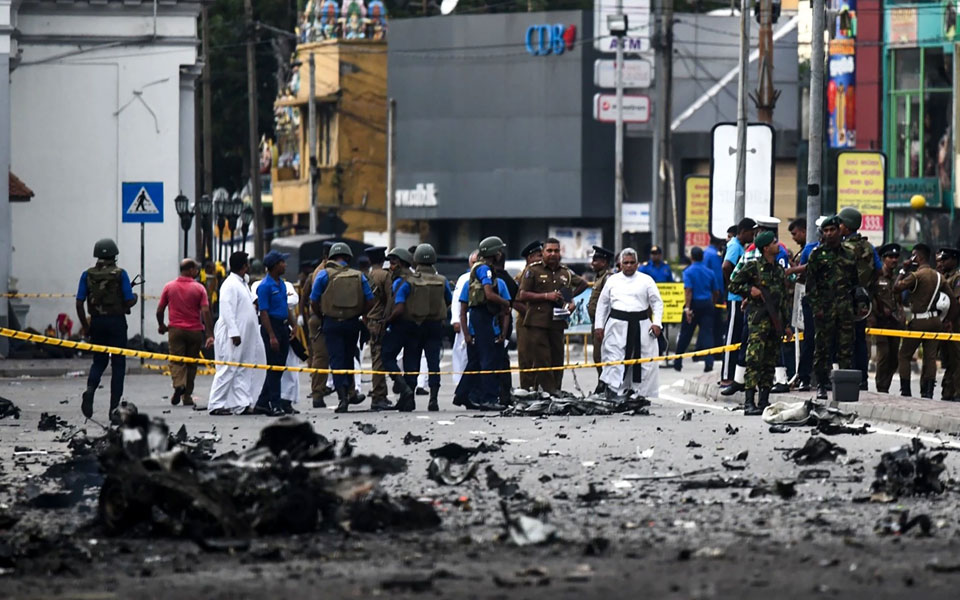Colombo: Sri Lanka's Defence Secretary Hemasiri Fernando resigned over his failure to prevent the Easter terror attacks even as the health ministry Thursday night sharply revised the death toll downward to 253, saying the previous figure of 359 was due to a "calculation error".
Prime Minister Ranil Wickremesinghe said authorities were targeting the "sleepers" who could trigger another round of bombings as police released photos of six suspects, including three women, wanted for their involvement in the attacks and sought information regarding them from the public.
Authorities earlier said nine bombers, believed to be members of a local extremist group called National Thowheed Jamath (NTJ), carried out the blasts that killed 359 people and wounded more than 500 others.
However, in an embarrassing revision, Dr Anil Jasinghe, Director General of the Health Services, said the larger death toll was released as a result of a calculation error.
"The approximate total of the dead would be 253 and not 359 as reported in media," he said in a statement.
Defence Secretary Fernando handed over his resignation letter to President Maithripala Sirisena Thursday. Sirisena had asked Fernando and Inspector General of Police Pujith Jayasundara to quit after their failure to prevent the blasts despite having prior intelligence.
Facing public criticism for not acting against extremist groups in the island nation, Prime Minister Wickremesinghe said some of the suspected attackers responsible for the Easter bombings were being monitored by the country's intelligence services.
But authorities did not have "sufficient" evidence to place the suspected attackers in custody prior to the attacks, he said.
Top officials have acknowledged that Sri Lanka received intelligence about possible terror strikes ahead of the attacks, but both Sirisena and Wickremesinghe have said that they did not receive the information.
Wickremesinghe told CNN that he did not rule out the possibility of more attacks in the country. He said authorities were now focussing on "sleepers" - terrorists who could activate another round of attacks.
"Police and security forces are rounding up those involved, but they're also rounding up the sleepers, those used on second and third rounds (of attacks)," he said.
"The danger has come down drastically, (but) we do have to pick up some more sleepers, which we will do in the next few days."
He said security services were acting out of an abundance of caution, and that should even one militant slip through the net, the damage could be widespread.
"It is a precaution that we are taking, we want to be sure we have everyone in," Wickremesinghe said. "They are worried that one or two could get into a church -- (even) one person can do a lot of damage."
The Lankan authorities have intensified their search operations with the help of the army and arrested 16 more suspects. Officials said that with the fresh arrests, the total number of suspects under their custody has risen to 76.
President Sirisena has said that 139 people have been identified as suspects in connection with the attacks.
Addressing an all-party conference, Sirisena said that a Combine Operation Centre will be established within the defence ministry for the enforcement of the country's security measures from Friday.
Many of the arrested people have suspected links to the NTJ, the group blamed for the bombings. However, the NTJ has not claimed responsibility for the attacks. The Islamic State has claimed responsibility for the attacks.
Meanwhile, security has been beefed up around "a certain category of mosques" after intelligence warning that the extremist group blamed for the Easter blasts was planning an attack on them during Friday prayers.
A letter, signed by DIG Priyantha Jayakody on behalf of Inspector General of Police Jayasundara, warned that the group which had carried out the Easter blasts was planning an attack on mosques on Friday, the Times Online reported.
The letter dated April 24, 2018 said a certain category of mosques identified as 'Awliya Mosques' could be possible target for these attacks.
"Security has been tightened in the vicinity of all mosques owing to these possible attacks. Therefore, the public need not worry," Jayakodi said.
The letter was addressed to the Presidential Security Division, the Special Security Division, and the Prime Minister's Security Division urging that the matter be brought to the immediate attention of the relevant authorities.
Chairman of the Dewatagaha Mosque in Colombo said that the State Intelligence Service has informed him of a possible threat by the group, which was involved in the Sunday's carnage.
He said that intelligence officers have also informed him that other mosques too would be warned of a possible attack in order for devotees to remain vigilant of possible threats.
Minister of Muslim Religious Affairs Abdul Haleem has requested the community members to avoid gathering for congregational prayers this Friday.
The Archdiocese of Colombo Thursday suspended all Catholic church services because of security concerns.
Let the Truth be known. If you read VB and like VB, please be a VB Supporter and Help us deliver the Truth to one and all.
Dubai: Smoke was seen rising from an area near the United States Consulate in Dubai, according to witness accounts cited by Reuters.
There was no immediate official confirmation on the extent of damage or whether there were any casualties in the incident.
Earlier, the US embassy in Riyadh, Saudi Arabia’s capital, was also attacked. Authorities reported damage to the premises, but no casualties were recorded.
The developments come amid heightened tensions in the region, with Iran continuing to target US interests in the Middle East following deadly attacks launched on Saturday by Israel and the United States.
Near US embassy in Dubai pic.twitter.com/z5VTZNVxNO
— Sahil Shah (@thesahilsshah) March 3, 2026





